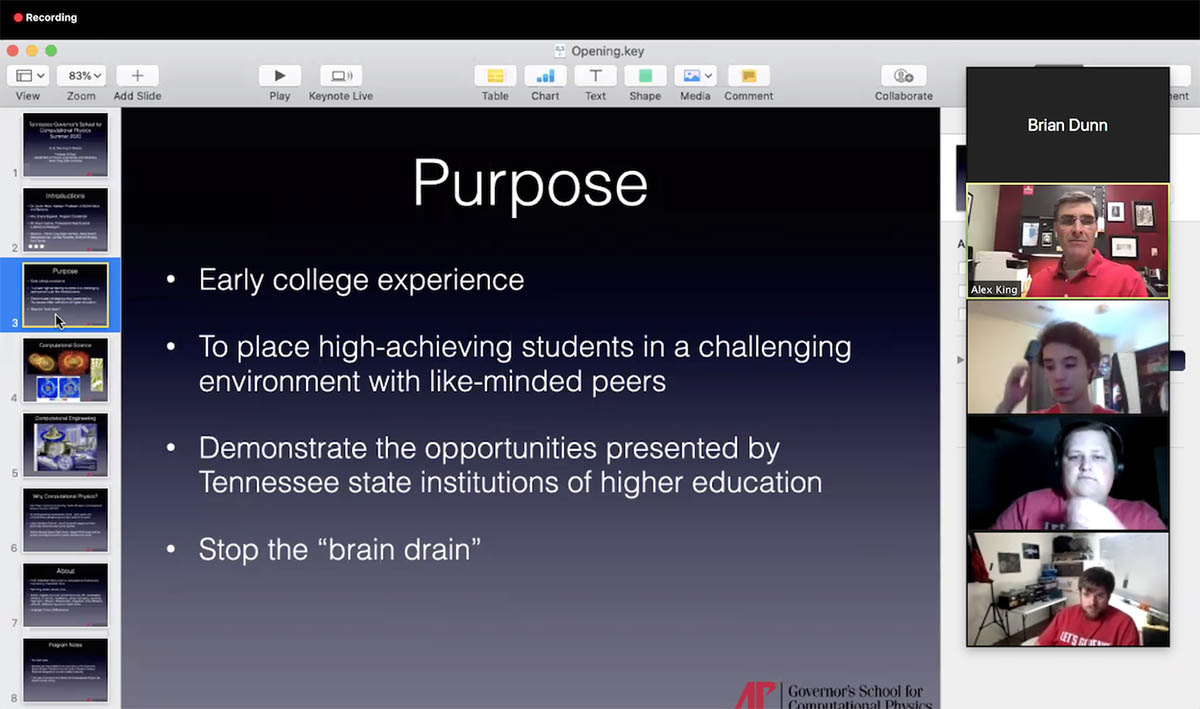 Clarksville, TN – The Governor’s School for Computational Physics returned for the 12th straight year to Austin Peay State University (APSU) this week, but something was much, much different than in previous years.
Clarksville, TN – The Governor’s School for Computational Physics returned for the 12th straight year to Austin Peay State University (APSU) this week, but something was much, much different than in previous years.

This year’s Governor’s School is entirely online.
Instead of living in Austin Peay State University residence halls for three weeks during the summer, this year’s crop of 36 high-achieving high school juniors and seniors from across the state are logging on for the experience.
“The Governor’s School is intended to be an early college experience – an early college residential experience,” said Dr. B. Alex King, chair of APSU’s Department of Physics, Engineering and Astronomy, which hosts the school.
“We are definitely losing that this year, but we are trying to come up with some ways with similar interactions to what the students would have were they living here on campus,” King stated.
How a typical day has changed
In a typical year, the Governor’s School students live on campus and attend lectures in the morning and in the early afternoon. They also have daily mentor-led activities.
King and math professor Dr. Daniel Mayo have shortened their lectures and taken them to Zoom.
“Normally, we have that one long morning class that goes from 9 to noon, but a solid three hours in class (on Zoom)?” King said. “That’s not anything anybody wants to do.”
So King is shifting some of the lecture focus to mentor-led breakout sessions. The mentors are six current Austin Peay State University students.
“The mentors are going to play a pretty big role in the entire thing,” King said. “The students will have projects that they work on each day … That’s going to be entirely with the mentors working with smaller groups of students.”
The mentors are Philip Long, Jared Averitt, Mackenzie Carr, James Forsythe, Kenneth Shipley and April Torres.
Bringing in guest lecturers
In a typical year, the Governor’s School for Computational Physics includes two field trips, one to the National Space Science Technology Center and the U.S. Space and Rocket Center in Huntsville, Alabama, and the other to the National Center for Computational Sciences at Oak Ridge National Laboratory. The pandemic forced the cancellation of those trips, though.
To provide a reasonable replacement for those trips, King invited six science professors from throughout campus to give presentations.
“We have scientists from other departments on campus coming in to give a little research talk about the sorts of things happening in their areas,” King said.
The guest lecturers are geosciences Dr. Christ Gentry, geosciences Dr. Kallina Dunkle, engineering Dr. Russ Longhurst, chemistry Dr. Allen Chaparadza, physics Dr. Justin Oelgoetz, and medical laboratory science Professor Jane Semler.
Austin Peay State University’s professional mad scientist Bryan Gaither also is delivering science demonstrations and helping with lab work during the school.
What is Governor’s School?
The state’s Department of Education offers 11 programs to high-achieving juniors and seniors across Tennessee. Topics cover science, the arts, business, technology, humanities, international studies and teaching.
The schools also introduce Tennessee’s high-achieving students to the value and resources the state’s public universities have to offer, King said.
The state provides scholarships to all the students to cover the costs of tuition and, in a typical year, room and board.
Austin Peay State University provides the Governor’s School for Computational Physics, which is an introduction to computational problems in physics and engineering. The students earn four credit hours – for Physics 2500 and Physics 2501 – by completing the school.
“In engineering and physics, and many of the other sciences, every system in nature is governed by some sort of equation,” King said. “Most of the time those equations are simply too complicated to solve by hand.
“We’re going to be tackling things – as simple as air drag, actually – that have complicated enough systems that we can’t do that by hand,” he added.
The school runs through June 26th and includes coding, lab work, class lectures and homework, all delivered virtually through such tools as Discord, Zoom and D2L, the online learning platform that APSU uses for its online classes.
To learn more
- For more about the APSU Department of Physics, Engineering and Astronomy, go to https://www.apsu.edu/physics/.
- For more about the APSU Department of Mathematics and Statistics, go to https://www.apsu.edu/mathematics/.
- For more about Governor’s Schools across the state, visit https://www.tn.gov/education/instruction/tdoe-governors-schools.html.



